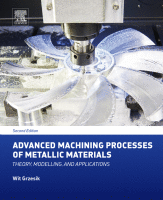Browse content
Table of contents
Actions for selected chapters
- Full text access
- Book chapterNo access
Chapter One - Introduction
Pages 1-5 - Book chapterAbstract only
Chapter Two - Metal Cutting Operations and Terminology
Pages 7-20 - Book chapterAbstract only
Chapter Three - Trends in Metal Cutting Theory and Practice
Pages 21-34 - Book chapterAbstract only
Chapter Four - Cutting Tool Materials
Pages 35-63 - Book chapterAbstract only
Chapter Five - Modelling and Simulation of Machining Processes and Operations
Pages 65-91 - Book chapterAbstract only
Chapter Six - Orthogonal and Oblique Cutting Mechanics
Pages 93-111 - Book chapterAbstract only
Chapter Seven - Chip Formation and Control
Pages 113-146 - Book chapterAbstract only
Chapter Eight - Cutting Vibrations
Pages 147-162 - Book chapterAbstract only
Chapter Nine - Heat in Metal Cutting
Pages 163-182 - Book chapterAbstract only
Chapter Ten - Cutting Fluids
Pages 183-195 - Book chapterAbstract only
Chapter Eleven - Tribology of Metal Cutting
Pages 197-214 - Book chapterAbstract only
Chapter Twelve - Tool Wear and Damage
Pages 215-239 - Book chapterAbstract only
Chapter Thirteen - Machinability of Engineering Materials
Pages 241-264 - Book chapterAbstract only
Chapter Fourteen - Machining Economics and Optimization
Pages 265-283 - Book chapterAbstract only
Chapter Fifteen - Advanced Machining Processes
Pages 285-397 - Book chapterAbstract only
Chapter Sixteen - Micro-Machining
Pages 399-436 - Book chapterAbstract only
Chapter Seventeen - Nanomanufacturing/Nanotechnology
Pages 437-465 - Book chapterAbstract only
Chapter Eighteen - Sensor-Assisted Machining
Pages 467-504 - Book chapterAbstract only
Chapter Nineteen - Virtual/Digital and Internet-Based Machining
Pages 505-531 - Book chapterAbstract only
Chapter Twenty - Surface Integrity
Pages 533-561 - Book chapterNo access
Index
Pages 563-578
About the book
Description
Advanced Machining Processes of Metallic Materials: Theory, Modelling and Applications, Second Edition, explores the metal cutting processes with regard to theory and industrial practice. Structured into three parts, the first section provides information on the fundamentals of machining, while the second and third parts include an overview of the effects of the theoretical and experimental considerations in high-level machining technology and a summary of production outputs related to part quality.
In particular, topics discussed include: modern tool materials, mechanical, thermal and tribological aspects of machining, computer simulation of various process phenomena, chip control, monitoring of the cutting state, progressive and hybrid machining operations, as well as practical ways for improving machinability and generation and modeling of surface integrity.
This new edition addresses the present state and future development of machining technologies, and includes expanded coverage on machining operations, such as turning, milling, drilling, and broaching, as well as a new chapter on sustainable machining processes. In addition, the book provides a comprehensive description of metal cutting theory and experimental and modeling techniques, along with basic machining processes and their effective use in a wide range of manufacturing applications.
The research covered here has contributed to a more generalized vision of machining technology, including not only traditional manufacturing tasks, but also potential (emerging) new applications, such as micro and nanotechnology.
Advanced Machining Processes of Metallic Materials: Theory, Modelling and Applications, Second Edition, explores the metal cutting processes with regard to theory and industrial practice. Structured into three parts, the first section provides information on the fundamentals of machining, while the second and third parts include an overview of the effects of the theoretical and experimental considerations in high-level machining technology and a summary of production outputs related to part quality.
In particular, topics discussed include: modern tool materials, mechanical, thermal and tribological aspects of machining, computer simulation of various process phenomena, chip control, monitoring of the cutting state, progressive and hybrid machining operations, as well as practical ways for improving machinability and generation and modeling of surface integrity.
This new edition addresses the present state and future development of machining technologies, and includes expanded coverage on machining operations, such as turning, milling, drilling, and broaching, as well as a new chapter on sustainable machining processes. In addition, the book provides a comprehensive description of metal cutting theory and experimental and modeling techniques, along with basic machining processes and their effective use in a wide range of manufacturing applications.
The research covered here has contributed to a more generalized vision of machining technology, including not only traditional manufacturing tasks, but also potential (emerging) new applications, such as micro and nanotechnology.
Key Features
- Includes new case studies illuminate experimental methods and outputs from different sectors of the manufacturing industry
- Presents metal cutting processes that would be applicable for various technical, engineering, and scientific levels
- Includes an updated knowledge of standards, cutting tool materials and tools, new machining technologies, relevant machinability records, optimization techniques, and surface integrity
- Includes new case studies illuminate experimental methods and outputs from different sectors of the manufacturing industry
- Presents metal cutting processes that would be applicable for various technical, engineering, and scientific levels
- Includes an updated knowledge of standards, cutting tool materials and tools, new machining technologies, relevant machinability records, optimization techniques, and surface integrity
Details
ISBN
978-0-444-63711-6
Language
English
Published
2017
Copyright
Copyright © 2017 Elsevier B.V. All rights reserved.
Imprint
Elsevier
